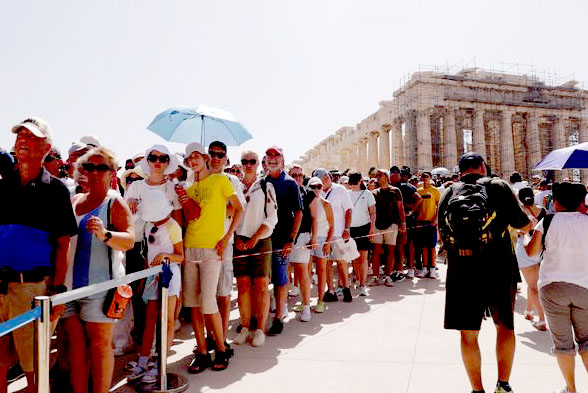Scorching Heatwave Shuts Down Acropolis in Athens, Sweeping Swelter Hits U.S. Southwest

In the blistering heatwave gripping southern Europe, Greece has taken the precautionary step of closing down the ancient Acropolis during the hottest part of the day, ensuring the safety of tourists. Meanwhile, over 100 million Americans are enduring an extended period of scorching weather.
According to the European Space Agency (ESA), which monitors temperatures through its satellites, Italy, Spain, France, Germany, and Poland are all facing unprecedented extreme conditions.
Forecasts indicate that next week’s temperatures might shatter Europe’s existing record of 48.8 degrees Celsius, set in Sicily back in August 2021.
Italian meteorologists have fittingly named the forthcoming phase of the European heatwave “Charon,” after the mythical ferryman who transported the souls of the deceased in Greek mythology. This follows the current phase, aptly named “Cerberus” after the three-headed dog of the underworld.
Last week, the world witnessed its hottest day ever recorded, attributed to the combined effects of long-term global warming caused by greenhouse gases and the short-term influence of El Niño, a regular warm-weather pattern originating in the Pacific.
The Southwest United States, accustomed to scorching summers, is also grappling with extreme temperatures that could potentially break records in the coming days.
Phoenix, Arizona, has already experienced 15 consecutive days of temperatures surpassing 110 degrees Fahrenheit (43.3 degrees Celsius), leading to mobile clinics treating homeless individuals suffering from severe burns and dehydration.
A recent study highlighting the impact of extreme summer heat revealed that as many as 61,000 people may have lost their lives due to sweltering conditions across Europe last summer.
Joan Ballester, a professor at the Barcelona Institute for Global Health and co-author of the study, emphasized the need for countries such as Italy, Greece, Spain, and Portugal to learn from France’s experience during the deadly 2003 heatwave. He suggested implementing relatively inexpensive measures, such as coordinating public entities and conducting a census of vulnerable populations. However, he acknowledged that more expensive measures, like redesigning cities to improve housing conditions, might be necessary.
Meanwhile, in Athens, where temperatures soar above 40 degrees Celsius, the authorities have taken the step of closing the Acropolis Hill during the hottest hours of the day. The iconic hill, home to the Parthenon temple and a popular tourist attraction, will be off-limits from noon to 5 p.m. (0900 GMT-1400 GMT).
Despite enduring long queues in the heat, where visitors shield themselves with hats, fan themselves, sip water, and carry umbrellas, the hill’s altitude and lack of shade make it particularly stifling.
One woman, feeling faint, received medical attention from paramedics while seated on the ground. Others were transported from the Acropolis Hill in golf carts and moved to wheelchairs.
Greece’s civil protection ministry has issued warnings about the risk of forest fires in five areas and advised people to refrain from tasks such as burning weeds to avoid triggering blazes. Wildfires have also erupted in parts of Croatia near the Adriatic coast.
Doctors have cautioned that the most vulnerable to heat-related issues are elderly individuals from disadvantaged backgrounds who already have existing health problems, such as heart issues, chronic bronchitis, stroke, and kidney failure. Angel Abad, a specialist in preventive medicine and public health at Madrid’s La Paz hospital, stressed that those without access to air conditioning face a higher risk and increased mortality upon arriving at an emergency ward.
The scorching heatwave gripping Athens and the sweltering conditions engulfing the U.S. Southwest underscore the urgency of addressing the impact of extreme weather events on human lives. It is crucial to implement measures that ensure the well-being and safety of vulnerable populations, mitigate the effects of heatwaves, and build more resilient communities.





